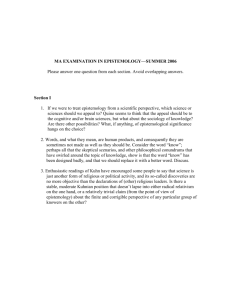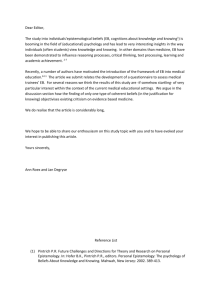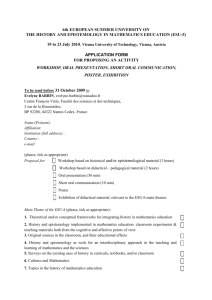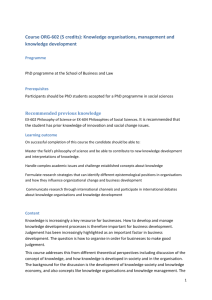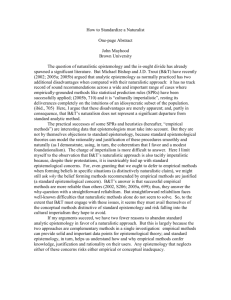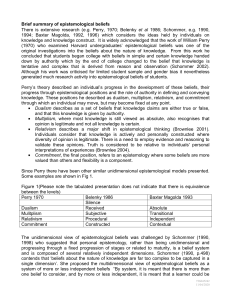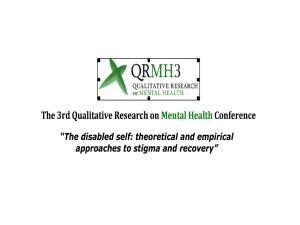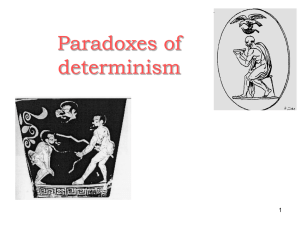On the substance of a sophisticated epistemology
advertisement
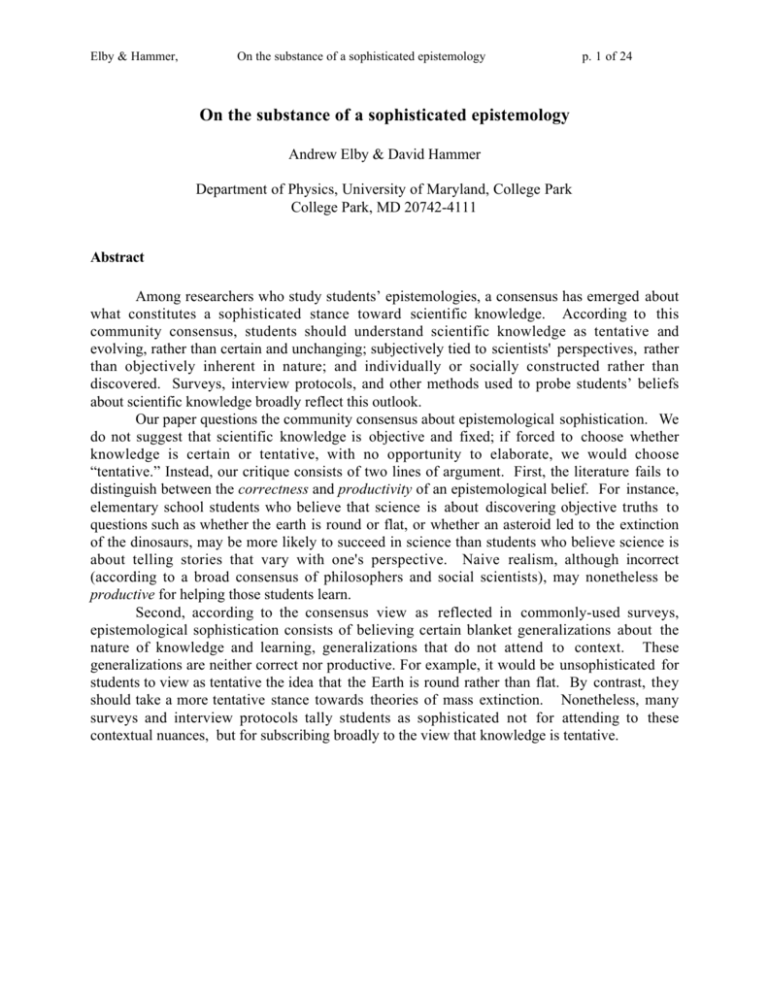
Elby & Hammer, On the substance of a sophisticated epistemology p. 1 of 24 On the substance of a sophisticated epistemology Andrew Elby & David Hammer Department of Physics, University of Maryland, College Park College Park, MD 20742-4111 Abstract Among researchers who study students’ epistemologies, a consensus has emerged about what constitutes a sophisticated stance toward scientific knowledge. According to this community consensus, students should understand scientific knowledge as tentative and evolving, rather than certain and unchanging; subjectively tied to scientists' perspectives, rather than objectively inherent in nature; and individually or socially constructed rather than discovered. Surveys, interview protocols, and other methods used to probe students’ beliefs about scientific knowledge broadly reflect this outlook. Our paper questions the community consensus about epistemological sophistication. We do not suggest that scientific knowledge is objective and fixed; if forced to choose whether knowledge is certain or tentative, with no opportunity to elaborate, we would choose “tentative.” Instead, our critique consists of two lines of argument. First, the literature fails to distinguish between the correctness and productivity of an epistemological belief. For instance, elementary school students who believe that science is about discovering objective truths to questions such as whether the earth is round or flat, or whether an asteroid led to the extinction of the dinosaurs, may be more likely to succeed in science than students who believe science is about telling stories that vary with one's perspective. Naive realism, although incorrect (according to a broad consensus of philosophers and social scientists), may nonetheless be productive for helping those students learn. Second, according to the consensus view as reflected in commonly-used surveys, epistemological sophistication consists of believing certain blanket generalizations about the nature of knowledge and learning, generalizations that do not attend to context. These generalizations are neither correct nor productive. For example, it would be unsophisticated for students to view as tentative the idea that the Earth is round rather than flat. By contrast, they should take a more tentative stance towards theories of mass extinction. Nonetheless, many surveys and interview protocols tally students as sophisticated not for attending to these contextual nuances, but for subscribing broadly to the view that knowledge is tentative. Elby & Hammer, On the substance of a sophisticated epistemology p. 2 of 24 1. Introduction Among researchers who study students’ epistemologies, a broad consensus has emerged about what constitutes a sophisticated epistemological stance toward scientific knowledge. This consensus can be traced to Perry’s (1970) groundbreaking study of college students' epistemological development, and also to threads of postmodernist philosophy epitomized by Kuhn's (1970) landmark treatise on the development of scientific theories. Perry found that college students progress from an absolutist to an increasingly-sophisticated relativist stance toward knowledge. Kuhn argued that paradigm shifts in scientific thinking occur or do not occur largely because of social factors, which influence how evidence is interpreted—and even what counts as compelling evidence. So, despite their different disciplines and methods of inquiry, Perry and Kuhn promulgated a similar sense of what constitutes sophisticated beliefs about the nature of knowledge, a sense reflected in current convictions. Specifically, most researchers believe that students should come to understand scientific knowledge as fundamentally tentative and evolving, rather than certain and unchanging; subjective in the sense that it reflects scientists' perspectives, rather than objectively inherent in nature; and individually or socially constructed rather than discovered. Students should, in addition, come to see scientific knowledge as a coherent, hierarchical system of ideas, rather than as a simple collection of facts. And they should view learning science as making sense of new ideas for themselves rather than as receiving and accepting information from authority. We use the term “consensus view” to label these widely-held tenets about what counts as epistemological sophistication As argued below, the consensus view is reflected in the surveys, interview protocols, and other methods used to probe students’ epistemologies. Our paper questions this consensus. We do not think scientific knowledge is objective and certain; if forced to choose whether knowledge is certain or tentative, with no opportunity to elaborate, we would choose “tentative.” Instead, our critique consists of two lines of argument. Elby & Hammer, On the substance of a sophisticated epistemology p. 3 of 24 First, the student epistemology literature fails to distinguish between the correctness and productivity of an epistemological belief. A belief is productive if it generates behavior, attitudes, and habits that lead to “progress” as defined by the given person or community. For instance, even if it is “true” that scientific knowledge is constructed by humans, it may be useful in some contexts for scientists and students to view knowledge as “discovered” in nature. Thus, elementary school students who believe that science is about discovering objective truths to questions such as whether the earth is round, or whether an asteroid led to dinosaur extinction, may ultimately be more likely to succeed in science than students who believe science is about telling stories that vary with one's perspective. Similarly, practicing scientists may find it productive to think of their work in ”objectivist” terms, despite the broad consensus among philosophers of science that naive realism is incorrect. Second, according to the consensus view as reflected in commonly-used surveys, epistemological sophistication consists of believing certain blanket generalizations about the nature of knowledge and learning, generalizations that do not attend to context. Such blanket assertions, we argue, are neither correct nor productive. A brief example illustrates the gist of our criticism. The notion that scientific knowledge is tentative and evolving does not apply equally across all scientific knowledge. For instance, it would hardly be sophisticated for students to view as “tentative” the idea that the Earth is round rather than flat. By contrast, they should take a more tentative stance towards theories about dinosaur extinction. Nonetheless, many surveys and interview protocols tally students as “sophisticated” not for attending to these contextual nuances, but for subscribing broadly to the view that knowledge is tentative. Section 2 fleshes out these two lines of criticism. We show that epistemological assessments “mis-measure” students’ epistemological stances precisely because they do not attend to context or to the productivity/correctness distinction. Interviews have a better chance of uncovering the contextual dependencies—and hence, the true sophistication—of students’ beliefs about knowledge. But the consensus view about what constitutes epistemological sophistication underweights the importance of these contextual Elby & Hammer, On the substance of a sophisticated epistemology p. 4 of 24 nuances. Therefore, as we argue in Section 3, this consensus leads researchers to neglect context in conducting and analyzing interviews. Finally, in section 4, we discuss the implications of our criticisms for research and instruction. 2. Critique of the consensus view about what constitutes epistemological sophistication In this section, we take up our two lines of criticism with respect to three of the four epistemological dimensions Hofer and Pintrich (1997a) identify as a consensus framework: Certainty vs. Tentativeness, Authority vs. Independence (Source of Knowledge), and Simplicity vs. Complexity.1 To these we add a fourth, overlapping dimension, Realism vs. Relativism, which is “built into” Certainty vs. Tentativeness in most frameworks but which warrants its own discussion, as shown below. We show that, for each dimension, a multiple-choice survey may neglect the distinction between productivity and correctness and may inadequately probe the contextual dependencies in students’ views of knowledge. We focus on Schommer's (1990) instrument, one of the most widely used and influential in the study of epistemologies; but our criticisms would apply to others as well. 2.1. Certainty vs. Tentativeness Most epistemological assessments tally students as sophisticated if they believe scientific knowledge to be tentative rather than certain (Hofer & Pintrich, 1997a). As a general belief, this is neither productive nor correct. 1 By “epistemological beliefs,” we mean students’ views about the nature of knowledge and also their views about the nature of learning. Elby & Hammer, On the substance of a sophisticated epistemology p. 5 of 24 Productivity Consider a high school physics student who believes Newton’s laws of motion are certain (for macroscopic, slow objects2). It is not clear that this belief hinders her learning. Of course, if she were in graduate school, taking an absolutist stance towards the topic of her dissertation may be unproductive. But in introductory physics, as long as she seeks coherence, tries to construct her own understanding, and focuses on concepts, the student should learn just as deeply as if she considered Newton’s laws to be uncertain. In fact, a student who believes Newtons laws are tentative might be at a disadvantage. Some implications of Newton’s laws seem, at first glance, to violate common sense. For example, according to Newton’s 2nd law, a car cruising forward at steady speed feels no net forward force. A student who views Newtonian mechanics as tentative may feel inclined to see the cruising car as an instance where Newton’s laws break down. diSessa’s (1993) subject makes exactly that choice. By contrast, a student who treats Newton’s laws as fixed truths has greater incentive to reconcile her intuitions about the cruising car with Newtonian mechanics. This kind of reconciliation is a productive study strategy (Hammer, 1994b). In brief, even if Newton’s Laws are not certain, it may be productive for introductory physics students to believe that they are. Data support this argument. One of us (Elby, 1999b) studied the epistemologies of California high students he taught in 1997-98, using the Epistemological Beliefs Assessment for Physical Science (White et al., 1999). Students' physics exam scores correlated with their epistemological sophistication about the complexity and coherence of physics knowledge, but not with their beliefs about certainty/tentativeness. This confirms Schommer et al.’s clinical study (Schommer, Crouse, & Rhodes, 1992) showing that students’ beliefs about the complexity of knowledge, but not their beliefs about the certainty of knowledge, correlate significantly with mathematical text comprehension. 2 Students learn that Einsteinian relativity, rather than Newtonian mechanics, applies to objects traveling near the speed of light. Elby & Hammer, On the substance of a sophisticated epistemology p. 6 of 24 Correctness A general belief that science is tentative is not only unproductive (in some contexts); it is also incorrect. First, not all scientific knowledge is equally uncertain and evolving. In general, ideas at the forefront are more tentative; it would be naïve to think that quantum field theory is the longsought Theory of Everything, At the same time, it would be unsophisticated to consider it tentative that the Earth is round or that the heart circulates blood through the body. We agree with Linn and Songer (1993) that epistemological sophistication includes the ability "to distinguish established and controversial ideas." Second, the context in which the knowledge gets applied can and should affect our attitude toward the certainty of that knowledge. For example, in an academic discussion, a philosophy professor may reasonably contend that all knowledge is ultimately tentative, including the very existence of the Earth. But in the context of her hospitalization for angina, the same professor should entertain no doubt about the existence and role of her heart. Sophistication does not consist of a blanket belief in either certainty or uncertainty; it consists of variegated judgments of certainty, depending on the particular knowledge and the particular context of its consideration. Hofer and Pintrich (1997b) found that students thinking about psychology took a more tentative stance towards knowledge than they did when thinking about (physical) science. According to the consensus view, this would indicate that students are epistemologically more sophisticated in psychology than they are in chemistry. By contrast, we concur with Hofer and Pintrich’s suggestion that their results may reflect student sophistication about the difference between the two disciplines. Partly because introductory science courses focus on the most well-established ideas in those disciplines, few ideas in an introductory psychology course are as precise, well-established, and dependable as are most of the ideas taught in introductory chemistry. Elby & Hammer, On the substance of a sophisticated epistemology p. 7 of 24 Unfortunately, current multiple-choice epistemological assessments cannot distinguish sophisticated tentativeness from naïve tentativeness. Consider this item from the Epistemological Beliefs Assessment for Physics Science (White et al., 1999):3 When it comes to controversial topics such as which foods cause cancer, there’s no way for scientists to know which scientific studies are the best. Everything’s up in the air! A student could agree with this statement because she has entered a philosophical (as opposed to practical) mode, or because she suspects that subtle methodological flaws invalidate recent epidemiological studies. By contrast, her agreement could reflect her belief that all statistics lie, that controlled experiments are less compelling than graphic anecdotal evidence, and that astrology is a better sources of knowledge than science is. So, a knowledge-is-tentative response may reflect sophisticated or naïve reasoning. A similar criticism applies, for example, to Schommer’s (1990) item, “Nothing is certain, but death and taxes.” 2.2. Realism vs. Relativism According to the consensus view, epistemologically sophisticated students believe that scientific truth is socially constructed, subjective and contingent, a position we call “relativism.” By contrast, unsophisticated students believe that scientific truth resides in nature waiting to be discovered, a view we call “realism.” We contend that relativism as a general belief is neither productive nor correct. Productiveness The most striking evidence that a realist epistemology may be productive is the extent to which practicing scientists—including many Nobel prize laureates—embrace it. Philosophers 3 When scoring this item, White et al. do not take agreement as automatically indicating sophistication. Elby & Hammer, On the substance of a sophisticated epistemology p. 8 of 24 and sociologists may consider these scientists' beliefs to be inaccurate, even naïve. But to question the accuracy of a belief is not necessarily to question its productivity. A belief is productive if it generates behavior, attitudes, and habits that lead to “progress” as defined by the a given person or community. For instance, a golfer may find it productive to believe that the swing can and should pass smoothly through the ball, without slowing. Careful observation reveals that this does not occur, even for the best golfers. Nonetheless, it is difficult to argue that the inaccurate belief about their swings is unproductive, watching a ball driven down the fairway by golfers who claim the club strikes the ball without slowing down. For scientists, realist beliefs support practices of inquiry that emphasize broad intersubjective agreement: Experimental results obtained by one scientist should be "reproducible" by another, and so on. Just as golfers may achieve better swings if they think of the club as passing smoothly through the ball, scientists may achieve more robust results if they think of nature as having independent properties they are discovering. Careful observations of scientists may reveal that their beliefs about scientific knowledge are incorrect; but it is difficult to argue that these beliefs are unproductive, given the achievements and stature within the scientific community of scientists subscribing to those beliefs. By the same token, students may find it productive to think of truth as residing in nature, to help them enter into the practices of science. Furthermore, a student holding this belief may be more inclined to think she has the ability to construct an understanding of that knowledge for herself, by reflecting upon her own experiences, doing experiments, and so on. A strident relativism, on the other hand, would be reason to depend on the instructor or text. After all, if scientific knowledge is nothing more than a human invention, then learning science is like learning any other story: One must be told. This may help to explain why Liza (Hammer, 1989), who articulately explained that physics knowledge is mainly a matter of human invention, also expressed—and showed consistently in her behavior—a belief that learning is a matter of receiving knowledge from authority. Elby & Hammer, On the substance of a sophisticated epistemology p. 9 of 24 Correctness Above, we argued that a relativist stance is no more productive than a realist stance for a student learning introductory science. Nor is it clear that relativism is more correct. Philosophers continue to debate realism versus relativism, in Philosophy of Science and other journals (Bradie, 1996; Leplin, 1992; Teller, 1995). A few points invite wide agreement, however. Most philosophers assert the untenability of naïve realism, the view that scientific knowledge is simply discovered in nature through careful observation. However, most philosophers also assert the untenability of “naïve relativism,” according to which scientific knowledge is nothing more than an arbitrary social construction unconstrained by nature. Nature constrains (but does not determine) the knowledge constructed by the scientific community. Philosophers argue about the extent and characteristics of the constraints. Given the nuances underscored by these debates, calling relativism sophisticated and calling realism unsophisticated is an oversimplification.4 For these reasons, we again contend that a sophisticated epistemology is nuanced and contextual. The questions used on most epistemology surveys, however, cannot distinguish naïveté from philosophical sophistication. For instance, consider this item from Schommer: Scientists can ultimately get to the truth A student who disagrees counts as sophisticated. But the item cannot distinguish naïve relativism (“scientists just make things up, so of course they can’t get to the truth”) from sophisticated relativism. 4 Unfortunately, extreme relativism has had disproportionate representation and influence in the popular press and on the education community, to the point that many people associate "constructivism" with "arbitrariness." To the contrary, many historians and philosophers (cf. Darden, 1991) believe that the ideas that emerge from the process of social construction in science are highly selected, and that selection is highly constrained by nature. Elby & Hammer, On the substance of a sophisticated epistemology p. 10 of 24 Furthermore—and here we rehearse a philosophical argument that relativism is self-defeating—a principled relativist cannot argue that the realist stance generally adopted within the scientific community is incorrect. If truth is relative to culture and context, then so is that notion itself. In other words, the view that truth is a social construction is itself a social construction, and its validity must be judged relative to the context and community of its construction: What is true within the practices of philosophy and sociology of science need not be considered true within the practices of science. The scientific community has constructed a realist epistemology according to which scientists look for truths that reside in—or are at least highly constrained by—nature. If relativists take their position seriously, they cannot say the scientific community is wrong. Instead, they must admit that realism is just as true for scientists as relativism is true for post-modernists. 2.3. Authority vs. Independence According to the consensus, epistemologically sophisticated students try to construct their own knowledge, while naïve students accept knowledge from authority. Our criticism focuses on the conflation of acceptance with understanding. We agree with the community that it is unproductive and incorrect to believe that authority can provide understanding. But authority can often provide information. For instance, we are not epistemologically naïve to accept that cows have multiple stomachs, on the authority of biologists, or that Andrew Wiles proved Fermat’s last theorem, on the authority of the mathematics community. That does not mean we understand the proof or the bovine digestive system. In general, we can accept a piece of knowledge as true without thinking we understand it. Current epistemological assessments ignore this distinction. Consider this example from Schommer's survey (1990): Sometimes you just have to accept answers from a teacher even though you don’t understand them. Elby & Hammer, On the substance of a sophisticated epistemology p. 11 of 24 If the student’s goal is to develop an understanding, then of course she should strongly disagree. But if her goal is get through the class, and if the tests reward rote learning, then the student should agree, even if she knows that accepting doesn’t imply understanding. In this case, the student’s agreement does not reflect epistemological naïveté. Our point is that a student’s response to the item depends on the context she attaches to the question, whether it is one in which the purpose is believing or understanding. For instance, one of us (Hammer, 1989) described a physics student, “Ellen,” who began the semester pursuing a conceptual understanding. Overwhelmed by the pace and algorithmic emphasis of the course, however, she eventually reverted to rote learning in order to get through the assignments and exams. Through all this, Ellen’s epistemological stance remained sophisticated; she knew she was not learning and she could articulate why, her frustration evident. Our concern here is that, despite her sophistication, Ellen would ruefully agree with “Sometimes you just have to accept answers from a teacher even though you don’t understand them.” Of course, we do not suggest that it is always sophisticated to trust authority on matters of fact. We would hope, for example, that students develop the epistemological resources to question and critique The Bell Curve(Hernstein & Murray, 1994). A blanket distrust of authority is no more sophisticated than a blanket trust. Epistemological sophistication requires abilities and inclinations to evaluate the trustworthiness of different sources of information, and to distinguish acceptance from understanding. 2.4. Simple vs. Complex (Pieces vs. Coherence) Just as we agree that understanding cannot come from authority, in many respects we agree with the consensus view regarding students’ beliefs about knowledge as "simple" or "complex." One of us (Hammer, 1994a) included the dimension "Pieces ´ Coherence" in a framework for characterizing students' epistemologies in introductory physics, at one end a view Elby & Hammer, On the substance of a sophisticated epistemology p. 12 of 24 that physics knowledge is a collection of isolated pieces, at the other a view that it constitutes a coherent whole. Productiveness We focus our criticism here on the matter of context raised above: Productive toward what end? Most epistemological assessments fail to acknowledge that students can have different opinions about what attitudes lead to high grades as opposed to genuine understanding. Elby (1999a) shows that many physics students spend disproportionate time learning formulas and problem-solving algorithms, even when they believe that gaining a deeper understanding requires other study strategies. These students complain that their tests reward quick, recipe-like problem solving. Here again, Ellen (Hammer, 1989), who decided to spend less time trying to make sense of the concepts and more time learning formulas and problem-solving routines, may have agreed (if sardonically) with Schommer’s Being a good student generally involves memorizing facts. Assessment items such as this cannot distinguish between students’ expectations about what their teachers reward and their epistemological stance about what constitutes a deeper understanding. Correctness We agree that, in most contexts, knowledge should be viewed as complex and interconnected rather than as simple and disconnected. But, again, sophistication consists more of having resources to sort out the complexity of knowledge in different contexts than of having a global, decontextualized opinion about this issue. For instance, learning physics differs from learning the names of State capitals precisely because of differences in the coherence of the target Elby & Hammer, On the substance of a sophisticated epistemology p. 13 of 24 knowledge. For this reason, a sophisticated learner would not express global agreement or disagreement with Schommer’s (1990) A sentence has little meaning unless you know the situation in which it is spoken. It depends on the sentence. The meaning of “Andy Elby lives in Virginia” depends on context, but much less so than the meaning of “Andy Elby needs help.” Ironically, our core concern about assessments such as Schommer's is that the sentences for which students are asked to rate their agreement and disagreement tend to be more rather than less dependent on context for meaning. Therefore, a student’s responses may depend sensitively on the context he attaches to each sentence. 3. How our critique applies to interview-based research In section 2, we criticized the consensus view on two grounds: (1) It fails to distinguish between the productivity and correctness of an epistemological belief, and (2) It views “epistemological sophistication” as believing certain blanket generalizations about knowledge, generalizations that do not attend to context. We showed how this consensus is built into commonly-used survey items, limiting the effectiveness of those items at gauging epistemological sophistication. Interviews have a better opportunity to probe students’ context-dependent stances towards knowledge. However, a researcher heavily influenced by the consensus view is liable to miss these opportunities, precisely because he is not attending sufficiently to context. In this section, using two well-known studies from the literature, we highlight how missed opportunities to examine the contextual nuances of students’ views toward knowledge lead to results that are less robust than they might otherwise be. Elby & Hammer, On the substance of a sophisticated epistemology p. 14 of 24 3.1. Attending to context during the interview Songer's and Linn's (Linn & Songer, 1993; Songer & Linn, 1991) influential work has focused attention on students' beliefs about the nature of scientific knowledge. We contend, however, that some of their conclusions are underdeveloped, because they did not pay sufficient attention to context in conducting their interviews. In their framework, a “static” stance holds that scientific knowledge is certain and unchanging, mostly facts to be memorized. A “dynamic” stance holds that scientific knowledge stems from evidence, changes and expands, and relates to daily life. However, in response to seven survey questions, most students (63%) held “some static ideas, some dynamic ideas, and some ideas that were difficult to categorize” (Linn & Songer, 1993). In their 1991 article (Songer & Linn, 1991), the authors characterized these students as having mixed beliefs. In our view, the seemingly inconsistent and hard-to-categorize responses could indicate that students attached different contexts to different questions. Researchers could explore these contextual nuances by conducting interviews in which students discuss their views toward various examples of scientific knowledge, ranging from ideas that are well established to those that are "cutting edge." The researchers could also vary how the ideas are phrased, and so on. By contrast, Linn and Songer (1993) conducted short interviews (15 minutes), simply asking students to explain their answers to the survey items. Only those students who proffered their own examples explained how their views applied to specific instances of scientific knowledge. Based on students’ brief responses, such as the idea that scientists can reach different conclusions about experimental results because “because everybody has a different opinion” or because “they can find something in the experiment, and then a week later they can find something else,” Linn and Songer (1993) concluded that students with mixed beliefs are relativists, in some cases radical relativists: Some students who abandoned a static view of scientific knowledge turned instead to a view that might be classified as radical relativism. These students had no criteria for comparing explanations and no ability to distinguish established and controversial ideas. Elby & Hammer, On the substance of a sophisticated epistemology p. 15 of 24 In our view, that students would abandon one set of ideas (static) for another (relativist) needs explanation; we need an account of how they construct their new epistemology from their previous knowledge. Furthermore, we doubt the “relativists” had "no ability to distinguish established and controversial ideas." Interview questions set in the context of discussing whether the heart pumps blood or whether the Earth is round may have activated absolutist (as opposed to relativist) ideas. Because Linn and Songer’s did not probe student beliefs in different contexts, the interviews did not fully explore their subjects’ abilities to distinguish established from cutting-edge ideas. 3.2. Attending to context in analyzing the data At first glance, King and Kitchener (1994) seem to avoid the criticisms we just raised. Their “reflective judgment interviews” are deeply contextualized, centering on rich issues such as the objectivity of news reporting, the safety of chemical additives in food, and the conflict between creationism and evolution. Such interviews can reveal contextual nuances in students’ views toward knowledge. However, King and Kitchener accept the consensus view about epistemological sophistication—specifically, the idea that sophistication (or lack thereof) consists of having certain blanket attitudes toward knowledge, attitudes that do not depend sensitively on the knowledge under discussion.5 Consequently, their scoring scheme focuses on the abstract form of subject’s responses and neglects the context-dependent meaning. This context-stripping leads to potentially misleading conclusions . For instance, reflective judgment stage 2 corresponds to an absolutist stance: Knowledge is either absolutely certain or certain but not immediately available, and it generally comes from 5 Specifically, they believe that people progress through successive stages of epistemological development, much as in Perry's (1970) original scheme. Elby & Hammer, On the substance of a sophisticated epistemology p. 16 of 24 direct experience or from authority. King and Kitchener cite the following subject as a definitive stage 2: Interviewer: How do you decide? Subject: I decide what goes with my views. Interviewer: Where do your views come from? Subject: My teachers and how I’ve been brought up. As you grow up, you automatically get certain views. It is possible that the subject is more sophisticated than she appears. King and Kitchener do not reveal the topic of discussion, but the subject may be discussing her religiously-inspired belief in creationism.6 Her beliefs, expressed in more academic language, could be When deciding what to believe about the origin of humanity, I take into account what fits with my religious views. Those views undoubtedly come from the way I was brought up, from my parents and teachers. When children are exposed to certain articles of faith over a long period, those beliefs get incorporated into the child’s views; it’s an automatic cognitive process. If this rewording reflects the subject’s views, then she holds some sophisticated relativist ideas about the origin of religious beliefs. Another rewording would make the subject sound firmly absolutist. We lack sufficient contextual information to characterize the epistemological sophistication of her statements in the above snippet. But in presenting this subject as a prototypical, presumably uncontroversial stage 2 absolutist, King and Kitchener feel no need to present the surrounding context of the conversation. For them, this subject is an absolutist by virtue of the form and informal tenor of her statements, independent of the contextualized meaning. 6 The interview snippet presented immediately before this one is explicitly about creationism vs. evolution. Elby & Hammer, On the substance of a sophisticated epistemology p. 17 of 24 Similar concerns apply to examples of reasoning at higher stages. The subject here explains her view of creationism and evolution as “complementary statements”: Well, in the first place, many religions of the world have creation stories. For example, one proposes that a divine being created the earth and its people. Some scientifically-minded would like to see that as a metaphor, in other words, that it’s not to be taken literally. From my own understanding, it seems in some cases almost as accurate to see the scientific understanding as a metaphor for the myth, which actually has the correct understanding in the sense that the myths are based on experience. That for me is the key to understanding this, the fact that we are here, the fact that we grow, indicates some direction and some possibility, even some purpose, if it can be taken a little bit further. And science, science tends to understand it as humans on top of the scale and something else on down to nothing. Well, in terms of the creation myth, this scientific understanding in a way could be a metaphor because it notes the patterns; its concern is to understand how these patterns develop from one to another into a more highly developed stage in the same way the myth explains the nature of creation and dissolution. It has to do with understanding cycles, of being part of a cycle, a much larger cycle that man is a very small part of. King and Kitchener present this as a prototypical stage 7 (highest level of sophistication), because it is a “complex reinterpretation of the issue…that reflects a higher-order synthesis.” We agree that, by reinterpreting evolution as a metaphor expressing humanity’s place in the universe, the subject articulately synthesizes creationism with evolution. In the context of a sociological analysis of the human need for a sense of progress and purpose, the synthesis is highly sophisticated. This synthesis is not sophisticated, however, with respect to the epistemological differences between notions of evolution and creation. It fails to address the ways in which the biological theory of evolution and religious stories of creation make contradictory claims and have different justifications for knowledge. Evolutionary theory is based primarily on scientific inference (although many adherents say it is consistent with religion), and it claims that the world is more than 10,000 years old and that our distant ancestors were not human. Creationism is Elby & Hammer, On the substance of a sophisticated epistemology p. 18 of 24 based primarily on faith (although many adherents say it is consistent with scientific evidence), and it claims that the Earth is less than 10,000 years old and that our most distant ancestors were human. Again, in some contexts, such as a discussion about the role of myths in society, it may be appropriate to downplay the epistemological and other differences between evolution and creationism. By contrast, in the context of a reflective judgment interview, discussing the source of knowledge and the justification for knowledge, we would expect an epistemologically sophisticated person to address the ways in which evolution proponents and creationism proponents disagree about the source of knowledge and the justification for knowledge. To brush aside these differences—in part, by reinterpreting a scientific theory as a “metaphor for [a] myth”—does not reflect the highest level of epistemological sophistication in this context. Nonetheless, King and Kitchener present this response as a prototypical stage 7, without telling us whether the subject, elsewhere in the interview, addresses these issues. 4. Implications for instruction and research In sections 2 and 3, we showed how the consensus view about epistemological sophistication can lead to underdeveloped research results. Here, we further discuss the methodological and pedagogical implications of our critique. Teachers, instead of trying to inculcate broad generalizations about the nature of science and knowledge, should create environments in which students explore and discuss the differences between knowledge in multiple contexts. For instance, a middle school teacher could do a unit on the solar system and a unit on the extinction of dinosaurs, focusing explicitly on the relationship between theories and evidence. Students could start to develop a feel for why some ideas (“the Earth is round”) are more certain than other ideas (“an asteroid killed the dinosaurs”). Epistemology researchers, including one of us (see Elby, 1999b), make heavy use of multiple choice and short-answer surveys, which are easily administered to large numbers of subjects. However, if contextual nuances play as large a role in epistemological reasoning as we suggest, then even the best-designed “decontextualized” surveys (such as Schommer’s (1990)) Elby & Hammer, On the substance of a sophisticated epistemology p. 19 of 24 face severe limitations in their ability to probe students’ epistemologies. To mitigate this problem, the survey can focus explicitly on a particular context, for instance, by probing students’ views toward knowledge and learning in their introductory physics class. Nonetheless, the context of filling out a survey about introductory physics class differs from the context of actually learning introductory physics. Therefore, triangulating with other methods is essential. Clinical interviews give researchers a better opportunity to explore the contextual dependencies of students’ epistemological stances. Depending on the researcher’s goals, she could 1. Focus deeply on a particular context, keeping in mind that the resulting epistemological “profile” of the subject may not apply to other contexts. One of us (Hammer, 1994a) followed this path. To characterize students’ epistemological views in introductory physics, he interviewed students repeatedly over the semester, asking open-ended questions about the course, talking about physics problems the students were tackling at the time, and otherwise trying to stay as close as possible to the context of the course itself. 2. Design interviews to probe how differences in context (such as discipline, intended use of the knowledge, and so on) trigger different epistemological responses in students. Even seemingly insignificant changes in context may make a difference. For instance, Hammer (1994a) found that students’ epistemologies in introductory physics can be consistently characterized with respect to three epistemological dimensions: Pieces ¥ Coherence, Formulas ¥ Concepts, and Authority ¥ Independence. By contrast, when diSessa (1993) interviewed a physics student, “J,” he focused the conversation not on the course, but on conceptual physics questions of a type rarely discussed in the class. His analysis of J's "epistemological stance" could not be aligned with Hammer's framework (diSessa, Elby, & Hammer, 2000). Other epistemological dimensions may capture J’s stance more adequately in that context. In our view, these results suggest that when a student completes a standard homework problem or lab in a traditional physics course, different epistemological Elby & Hammer, On the substance of a sophisticated epistemology p. 20 of 24 resources may be activated than when a student contemplates a “common-sense” issue such as what forces act on a ball thrown straight up, with the contemplation occurring in a “nonphysics” setting (outside the physics building, with no textbooks around, with a professor of education, and so on). Interviews can shed light on these differences.7 This discussion implicitly advocates a new way of viewing epistemological research. Much previous work focuses on characterizing the extent to which students’ epistemologies differ from those of experts. Unfortunately, this research gives little guidance to a constructivistminded teacher who wants to help students build on their prior knowledge to develop more productive epistemological beliefs. By contrast, we suggest that research should focus also on identifying epistemological resources (Hammer and Elby, in press) that students use in some contexts but fail to apply in other contexts where they might be useful. Using the results of this research, a teacher could help students’ “re-deploy” epistemological knowledge they already have. Finally, we advocate the greater use of “naturalistic” studies in which the researcher, working from videotapes and other records, analyzes how students view and use knowledge while actually doing a lab, working on a problem, talking about physics in the hall with a friend, and so on. Hogan's (1999) work is an example: One component of her study involved observing students at work, and comparing her observations against scores on standardized epistemological surveys. 5. Conclusion In this paper, we challenged the consensus that has arisen among researchers of students’ epistemologies about what constitutes a sophisticated epistemological stance. We also showed how the influence of this consensus view on survey-based and interview-based research has led to research results that are less robust than they might otherwise be. 7 By “epistemological resources,” we mean the cognitive building blocks from which students construct their epistemological views. See below and (Hammer & Elby, forthcoming). Elby & Hammer, On the substance of a sophisticated epistemology p. 21 of 24 First, we argued, productive epistemological beliefs—ones that help students to learn—sometimes differ from “correct” epistemological beliefs espoused by philosophers and social scientists. For instance, a student who holds the philosophically-suspect view that scientific principles reside in nature has reason to think about her everyday experiences when trying to understand physical laws—a productive learning strategy. Second, a sophisticated epistemology does not consist of blanket generalizations that apply to all knowledge in all disciplines and contexts. It incorporates contextual dependencies and judgments. For instance, instead of having a general tendency to view knowledge as certain or tentative, it is more sophisticated to take into account • • • the discipline (Knowledge taught in introductory chemistry is more certain than the knowledge taught in introductory psychology.); the particular knowledge under discussion (It is more certain that the Earth is round than that Mars is lifeless.); and the intended use of the knowledge. (E.g., an emergency medical procedure vs. an academic discussion about theory formation.) Surveys cannot fully attend to these contextual dependencies. Moreover, interviews do not automatically solve the problem. During the interview itself, and also while coding the data, researchers can fail to consider contextual nuances, resulting in potentially misleading diagnoses of students’ epistemologies. To counteract these problems, we suggest relying less on surveys, contextualizing interviews more deeply, and using more naturalistic (observational) methods. In addition, we contend that research should focus less on ranking the overall sophistication of students’ epistemologies, and more on identifying productive epistemological resources that students can build upon (with their teachers’ help) to become better learners. We treat this last point more fully elsewhere (Hammer & Elby, forthcoming), where we focus not on the substance of (good) epistemological beliefs, but rather, on the form of students’ epistemological knowledge. The consensus view holds that epistemological knowledge, whether Elby & Hammer, On the substance of a sophisticated epistemology p. 22 of 24 naïve or sophisticated, consists of declarative beliefs. These beliefs are assumed to be articulate (students can express them if asked the right questions) and stable across contexts. In this model, epistemological development consists largely of replacing naïve beliefs, such as “knowledge is certain,” with more sophisticated ones, such as “knowledge is tentative.” By contrast, we suggest, much of students’ naïve epistemological knowledge consists not of articulate beliefs, but rather, of epistemological resources—often implicit, often inarticulate—that can be triggered in different combinations by different contexts. Here is an example. When asked how he knows what’s for dinner, a child might answer, “Because Daddy told me!” However, when the same child is asked how he knows his doll’s name, he might answer, “ “I made it up!” So, the child does not have the blanket belief that knowledge is transmitted or constructed. He has cognitive resources for viewing knowledge in either way. The dinner question triggers “transmissionist” resources, while the doll question triggers “constructivist” resources. Similarly, when a physics student listens passively instead of trying to construct his own understanding, it is not necessarily because he holds the general belief that “knowledge is transmitted from authority.” In a fine-arts class, the same student may view knowledge about sculpting lifelike faces as something that students must construct for themselves. His difficulty in physics, we contend, stems not from blanket transmissionist beliefs, but from the overactivation of “transmissionist” epistemological resources at the expense of “constructivist” resources. In that case, his epistemological development would consist (in part) of cueing those constructivist resources not just in art class, but also in physics. An advantage of a resources-based model of epistemologies is that it can better account for the contextual dependence in the substance of naïve and sophisticated epistemologies. Elby & Hammer, On the substance of a sophisticated epistemology p. 23 of 24 Acknowledgments Funding for AE’s work was provided by NSF grant DGE9714474. We are grateful for helpful suggestions by two anonymous reviewers. References Bradie, M. (1996). Ontic Realism and Scientific Explanation. Philosophy of Science, 63(3), S315S321. Darden, L. (1991). Theory Change in Science: Strategies from Mendelian Genetics. New York: Oxford University Press. diSessa, A. (1993). J's Epistemological Stance and Strategies. Paper presented at the American Education Research Association. diSessa, A. A., Elby, A., & Hammer, D. (2000). J’s Epistemological Stance and Strategies. In G. Sinatra (Ed.), Intentional Conceptual Change . Mahwah, NJ: Lawrence Erlbaum Associates. Elby, A. (1999a). Another reason that physics students learn by rote. American Journal of Physics. Physics Education Research Supplement, 67(7 SUPP1), S52-S57. Elby, A. (1999b). A high school curriculum designed to nudge students' epistemological beliefs. Paper presented at the American Education Research Association, Montreal. Hammer, D. (1989). Two approaches to learning physics. The Physics Teacher, 27(9), 664-670. Hammer, D. (1994a). Epistemological beliefs in introductory physics. Cognition and Instruction, 12(2), 151-183. Hammer, D. (1994b). Students' beliefs about conceptual knowledge in introductory physics. International Journal of Science Education, 16(4), 385-403. Hammer, D., & Elby, A. (forthcoming). On the form of a personal epistemology. In B. K. Hofer & P. R. Pintrich (Eds.), Personal Epistemology: The psychology of beliefs about knowledge and knowing . Mahwah, NJ: Erlbaum. Hernstein, R., & Murray, C. (1994). The Bell Curve: Intelligence and Class Structure in American Life. New York: Free Press. Hofer, B. K., & Pintrich, P. R. (1997a). The development of epistemological theories: Beliefs about knowledge and knowing and their relation to learning. Review of Educational Research, 67(1), 88-140. Hofer, B. K., & Pintrich, P. R. (1997b). Disciplinary ways of knowing: epistemological beliefs in science and psychology. Paper presented at the American Educational Research Association, Chicago. Elby & Hammer, On the substance of a sophisticated epistemology p. 24 of 24 Hogan, K. (1999). Relating students' personal frameworks for science learning to their cognition in collaborative contexts. , 83(1), 1-32. King, P. M., & Kitchener, K. S. (1994). Developing Reflective Judgment: Understanding and Promoting Intellectual Growth and Critical Thinking in Adolescents and Adults. San Francisco: Jossey-Bass. Kuhn, T. S. (1970). The Structure of Scientific Revolutions. Chicago: University of Chicago Press. Leplin, J. (1992). Science and Relativism - Some Key Controversies in the Philosophy of Science - Laudan, L. Philosophy of Science, 59(4), 713-714. Linn, M. C., & Songer, N. B. (1993). How do students make sense of science? Merrill-Palmer Quarterly- Journal of Developmental Psychology, 39(1), 47-73. Perry, W. B. (1970). Forms of Intellectual and Ethical Development in the College Years: A Scheme. New York: Holt, Rinehart, and Winston. Schommer, M. (1990). The effects of beliefs about the nature of knowledge in comprehension. Journal of Educational Psychology, 82(3), 498 - 504. Schommer, M., Crouse, A., & Rhodes, N. (1992). Epistemological Beliefs and Mathematical Text Comprehension: Believing it is simple does not make it so. Journal of Educational Psychology, 84, 435-443. Songer, N. B., & Linn, M. C. (1991). How do students' views of science influence knowledge integration? In M. C. Linn, N. B. Songer, & E. L. Lewis (Eds.), Students' models and epistemologies of science (Vol. 28, pp. 761-784). Teller, P. (1995). Reading the Book of Nature - an Introduction to the Philosophy of Science Kosso, P. American Journal of Psychology, 108(1), 147-150. White, B., Elby, A., Frederiksen, J., & Schwarz, C. (1999). The Epistemological Beliefs Assessment for Physical Science. Paper presented at the American Education Research Association, Montreal.
